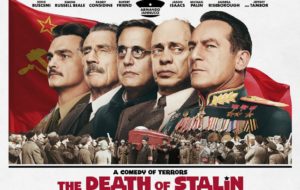This is a film my sweetie-wife and I have been looking forward to for a few months. From the creative mind Armando Iannucci, the man behind Britain’s The Thick of It and HBO’s Veep. The Death of Stalin is a  fictionalized, partially farcical partly horrific account of the power struggle following the death of the Soviet dictator Joseph Stalin 1953. As with all dramatic films based on historical events one should not aspire to learn history from a movie.
fictionalized, partially farcical partly horrific account of the power struggle following the death of the Soviet dictator Joseph Stalin 1953. As with all dramatic films based on historical events one should not aspire to learn history from a movie.
While the film possesses Iannucci’s distinctive farcical characterizations and sense of absurdity when dealing with powerful bureaucratic people it also has sense of totalitarian terror. Often these two disparate elements are separated by only a cut creating a juxtaposition truly worthy of Soviet film montage theory. This clash of the farcical and the terrible has been commented in other reviews and for many reviewers it was off putting. However I think that the effect Iannucci was striving for was an understanding and emotional reality of how the absurd becomes the terrible so easily. The whiplash of the competing tones keeps the viewer off balance and unable to emotionally predict the coming scenes much like how the people brutalized by such a reign of terror live in a constant state of anxiety.
The plot concerns itself with two man who are vying to take Stalin place following his fatal stroke, Nikita Krushchev head of the Communist Party, and Lavrentiy Beria, head of the NKVD, the regime’s dread secret police. Krushchev is presented as the reformed, the man who wants to stop the mass murders, the false imprisonments, the reign of terror, while Beria, in addition to being the man carrying out all the murder and torture, is portrayed as a ruthless figure with depraved sexual appetites. Like all worthy protagonists Khrushchev is fighting beyond his weight class, Beria has prepared for this moment and moves with ruthless efficiency as he consolidates the power into his hands. Given the brutal nature of the struggle this rapidly transforms the contest into one of survival.
Steven Buscemi plays Krushchev. He makes no attempt, nor for the most part does the other actors, to adopt a Russian accent and his portrayal is one filled with the anxiety of a man over his head. There is a passing reference to Krushchev’s service at Stalingrad so it is also clear that this man is no wilting flower. Simon Russell Beale plays Beria and it is about as far from his role of Falstaff in The Hollow Crown as is possible. Despite these powerful performances the scene-stealer in this movie is Jason Isaacs, possibly best know to genre fans as Lucius Malfoy in the Harry Potter franchise, as Zhukov, head of the army. Zhukov both historically and in the film is a larger than life character and one that dominates every scene in which he appears.
The final casting element I want to discuss is Foreign Minister Molotov. A man who is on the outs and destined to appear on one of Stalin’s dreaded lists, Molotov is played with nervous energy my Python alumni Michael Palin. In addition to a fine bit of casting, this also I think draws a direct connection between The Death of Stalin and it cinematic cousin, Brazil. There is no doubt in my mind that these two absurd dark films are speaking with one voice. Gilliam and Iannucci both seem to be concerned, and rightly so, about the abuses of power, the childish nature of those chasing it, and in the end the terror that promises for everyone under their heels.
The Death of Stalin is not a movie for everyone. The clashing of humor and horror is designed to be jarring but it is a film I thoroughly enjoyed.
